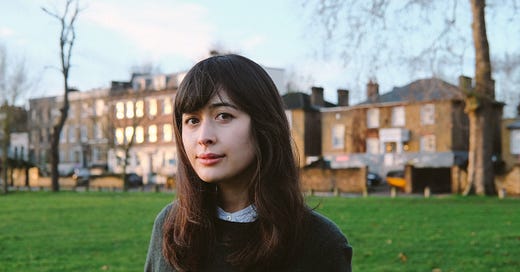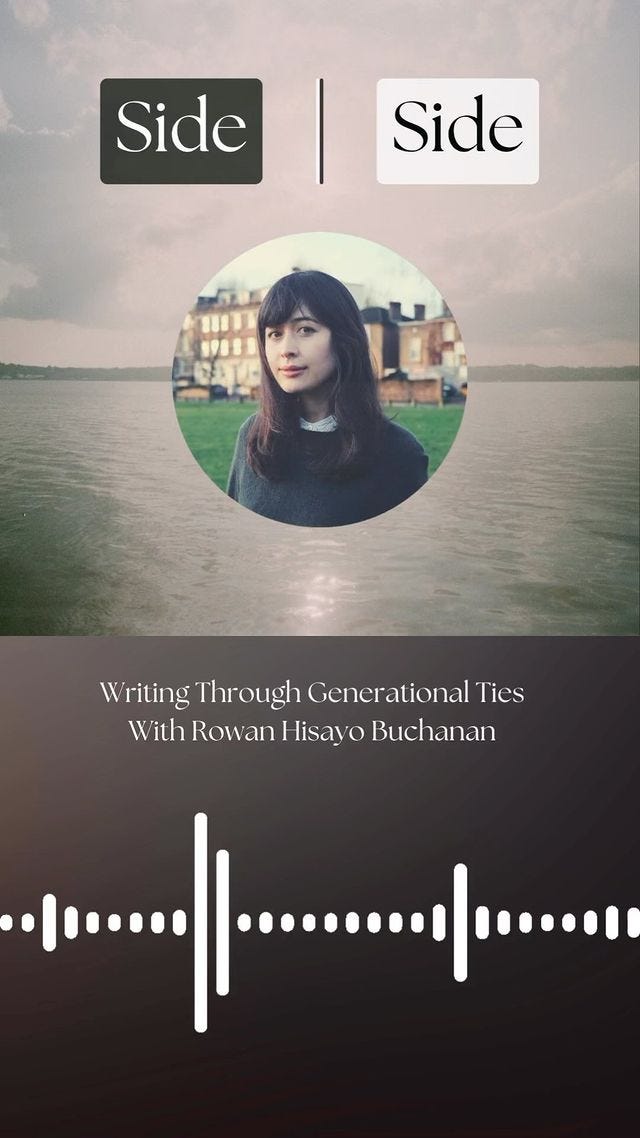Rowan Hisayo Buchanan: “The conversation of what I have, have lost and have longed for doesn’t fit into a word”
The author on mixedness as freedom, the multiplicity of our experiences and writing mixed stories
Hi, welcome back to Mixed Messages! This week I’m speaking to author Rowan Hisayo Buchanan, who is of mixed Chinese, Japanese and British heritage. Rowan’s new novel, The Sleep Watcher, is out on Thursday. The story follows Kit, whose body lies in bed while she wanders through her home and her seaside town, witnessing violence, fractured relationships and the secrets held behind closed doors. I always love Rowan’s portrayal of mixedness, and speaking to her for this newsletter was lyrical. Read her story below.
What’s your racial background?
My dad is British, he’s three quarters Scottish if you want to break it down. My mum is half-Japanese, half-Chinese.
In terms of language, I have a huge amount of respect for various thinkers, especially those who are mixed-race, and the care that they put into that language. But I find the pressure to find the exact right summary for yourself can be an energy drain and stop you from living your life.
In Japan, someone like me would be called hafū, but there’s an older term that basically translated as ‘love child,’ which meant ‘bastard.’ It was very offensive. Now, there’s a movement of parents who want to call their children daburu, which means double, reflecting that their children have two heritages, not half of each. That’s really beautiful.
I’ve heard people talk about why they don’t like mixed because it implies there’s some purity, which you and I know doesn’t exist. I’ve let people call me most things as long as they’re not trying to be deliberately offensive or hurtful. If I'm close to someone, or they actually seem interested, I'll tell them my story and the complexity of the things that I have, the things that I’ve lost and the things that I’ve longed for. That conversation isn’t going to fit into a word or a couple of hyphens.
Has your sense of self shifted over time and place?
I’ve definitely noticed the shifting in how I was perceived. When we talk about mixed-race people, passing is often thought of as a very static thing. But over the course of my life, my appearance has changed. I was a really East Asian looking toddler and child. I started to ‘pass’ more during puberty, but it's incredibly context dependent. People in the States are more likely to identify me as being mixed rather than just being odd-looking.
I wouldn’t say that new perception has fundamentally changed me, I am who I am, but it allowed me to understand myself better. I see myself in different mirrors and think ‘this feels right’ or ‘this doesn’t feel right.’ That helped me think about who I am and what it means to me.
How have you connected to your East Asian culture?
I don’t speak fluent Chinese or Japanese. I feel a real sense of loss of the potential for connection that could have existed if I had the language, and I’m always jealous of mixed-race people who do have it. But it’s a central part of my family's story that my mother grew up with parents who didn't speak each other's first language, so their shared language was English. She experienced it as something she was forced to do, she wanted to free me and I can’t resent her for that.
The standard seasonings in our house are mirin and soy sauce. I keep thinking about this Celeste Ng talk where she shares how the cutlery dividers in her family home could never fit chopsticks in – it hit me like a brick. I just thought we were messy, but things didn’t physically fit and I’d gotten into my 30s without understanding that there’s a reason it was impossible to organise a cutlery drawer neatly.
Then there are things where you don't know if they're just a quirk of your family or part of your culture until you meet someone else who shares them. My mum was the most loving person, but she doesn't want you to hug her for any long period of time. That’s very cultural. I didn’t figure that out until decades in. There's almost this process of investigation into yourself to figure out all the roots of things in your life.
Chinese and Japanese literature was also very important to my mother – they were very influential to me as a writer. For most of my childhood and teens, I felt like an outsider, not even because I was being persecuted for it. I couldn't explain myself because my reference points weren't other people's reference points. No conversation could take place. I found that with writing, I was able to account for my experience and somebody could understand what I was trying to say.
I love your portrayal of mixed characters throughout your writing – why was this representation important to you?
Starting out as a writer, having a mixed character put such a burden on the story because people almost expected the story to be about how this person’s parents got together. How are you going to shove in all this backstory that might not be important to that character in that moment? That’s the thing about anyone’s racial identity, sometimes it’s the most important thing that's happening and sometimes it's not. I felt very overwhelmed by it, but that’s not a reason to stop writing.
In my debut novel Harmless Like You, Jay is half-Japanese and has been abandoned by his Japanese-American mother. For him, it’s a huge thing that he’s working through and thinks about a lot, including how he’s perceived. In my second novel Starling Days, Oscar has the opposite attitude. He doesn’t want to acknowledge that being mixed is important to him. He thinks that kids who go on about identity are cringey, he just wants to be accepted.
In my third novel The Sleep Watcher, the mother of the protagonist is mixed-race. The protagonist thinks about how people see her mother as an outsider, and that it’s still in her but people don’t see it. It’s still part of her experience, but in a more subtle way.
What was important to me was not just having mixed characters, but saying there are many different ways to be mixed-race and live with those identities.
Do you think there are any stereotypes around the idea of mixedness?
When I was a teenager, some teenage boys I knew (who admittedly had the mindset of teenage boys) ranked the races of girls they found attractive. They placed mixed-race girls highly, and I think this was supposed to please me.
There’s often a real emphasis on the aesthetic existence of mixedness, and yes that can absolutely affect your experience, but when that becomes your all-consuming way of understanding it rather than including culture, background, family experience and the whole complicated package, that can become very limiting.
What’s the best thing about being mixed for you?
I think it’s given me a sense of freedom from normality. It was stressful to feel like a weird kid growing up, but once you realise you can’t be normal, you get to think about what and who you want to be in this world. I think that’s a real gift.
Can you sum up your mixed experience in a word?
Multifarious.
There are so many different ways of existing, even within one person. I talked a lot here about my Japanese side, I barely talked about my Chinese side. I could go on about what it means that my grandmother could only read traditional Chinese because she left before they switched alphabets or that my grandfather missed Japan horribly while my grandma’s party line was that China was dead to her, but there’s not time today to have all of these conversations, and that’s why I like that word.
For me, I want being mixed to be about freedom rather than about being defined by one thing.
Pre-order The Sleep Watcher here. Next week, I’ll be speaking to brewer and author Jaega Wise. Subscribe to get Mixed Messages in your inbox on Monday.
Enjoy Mixed Messages? Support me on Ko-Fi! Your donations, which can start from £3, help me pay for the transcription software needed to keep this newsletter weekly, as well as special treats for subscribers. I also earn a small amount of commission (at no extra cost to you) on any purchases made through my Bookshop.org affiliate links.
Mixed Messages is a weekly exploration of the mixed-race experience, from me, Isabella Silvers. My mom is Punjabi (by way of East Africa) and my dad is white British, but finding my place between these two cultures hasn’t always been easy. That’s why I started Mixed Messages, where each week I’ll speak to a prominent mixed voice to delve into what it really feels like to be mixed.








Beautifully expressed!